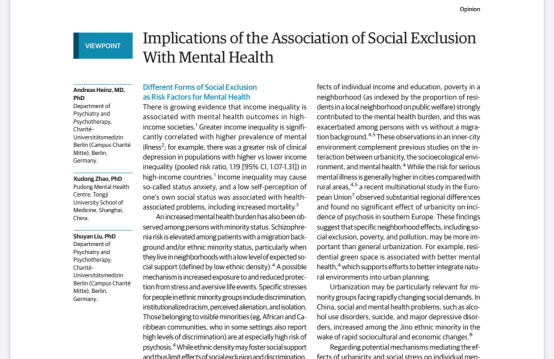JAMA Psychiatry (the second-largest journal in the field
of psychiatry, IF=15.92) published an online article entitled “Implications
of the Association of Social Exclusion With Mental Health” on October 9,
2019. This special column “Viewpoint” was written by Prof. Zhao Xudong from
Tongji University School of Medicine, together with Prof. Andreas Heinz and Dr.
Liu Shuyan from Charité – Berlin University of Medicine as a cooperative result
of the newly established Sino German Institute of Mental Health, Tongji
University School of Medicine.

The author
selected the most representative literature, including the results and
conclusions of large-scale epidemiological studies, clinical studies,
longitudinal cross-cultural studies, experimental studies, and systematic
reviews, and discussed the relationship between the group barrier formed by
culture, race, class and other factors and mental health and mental disorders.
In this study, the
researchers discussed the mental health status of ethnic groups in the
fast-changing society from the perspective of social and cultural changes,
citing the results of the research “Prevalence and prognosis of
schizophrenia in Jinuo people in China: A prospective 30-year follow-up study”
initiated by Professor Wenpeng Wan in 1979 and conducted by three generations of
Chinese scholars for more than 30 years. Also, from the perspective of
urbanization, the researchers analyzed the interaction and circular causality
relationship between wealth disparity, low social status, immigrant adaptation
and mental health indicators at a macroscopic social level. This paper also
interprets the interaction of individual psychological health and psychological
factors in the aspect of individual subjective well-being, sense of gain and
expectation value (expectation for failures). Finally, from the perspective of
public health (international community-nation-community medicine),
comprehensive measures to improve mental health was proposed, which included
not only the adjustment of national macro policies, the development of regional
economy and community construction but also the individualized intervention of
psychiatrists and psychotherapy professionals.
Under the
background of promoting “Healthy China” initiative, the viewpoint of this paper
casts some new light on laying out development strategies that focus on the
overall well-being of the people, eliminating poverty and unbalanced growth,
and offering people stronger sense of gain, happiness, and fairness in the modernization
of our country. It also inspires the professionals to put more effort into
studying the interaction of biological, psychological and social factors in the
mental health and mental hygiene work in the future.
JAMA Psychiatry
is a sub-journal of JAMA, one of the four largest medical journals in the
world. It started publication in 1959 and formerly named Archives of General Psychiatry.
In 2013, it was officially renamed JAMA Psychiatry . It is an international
peer-reviewed journal with 12 issues published annually. In 2019, the impact
factor of JAMA Psychiatry magazine was 15.916, ranking the second in the field
of psychiatry.
